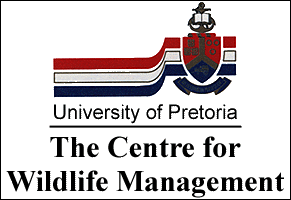

| THE TRAINING PROGRAMME |
The BSc(Hons) (Wildlife Management) degree course starts in January and ends in November. Each individual student selects a research topic on a game ranch or nature reserve, within his/her field of interest. On average two weeks per month throughout the year are spent on the ranch/reserve merging theory and practice in nature. The remainder of the time is spent on campus with course work, seminars and practicals.

The course work includes communication skills, computer literacy, research project design, animal population dynamics, wildlife management and nutrition, game capture and diseases, range evaluation and carrying capacity, wildlife ecology, vegetation classification and dynamics, soil classification, social anthropology and ecotourism management. Three excursions to wilderness areas are also part of the course.
The MSc and PhD studies are based upon a research project located within South Africa, other parts of Africa and further afield.
1. Introduction:
The Centre for Wildlife Management is part of the Department of Animal and Wildlife Sciences, which in turn falls under the auspices of the Faculty of Biological and Agricultural Sciences of the University of Pretoria.
The first wildlife management course started in 1965. This eventually led to the establishment of the Eugène Marais Chair of Wildlife Management in 1970, which still serves as the driving force behind the Centre.
The current Honours degree in Wildlife Management being offered by the Centre is a fulltime postgraduate degree.
2. Prerequisites for admission:
Prospective students must have completed a BSc degree with ecology, zoology and/or botany or a relevant subject; or a BSc(Agric) (Animal Sciences and/or Plant Production); or a BSc(Forestry), or a BVScdegree (Veterinary Science) or one similar to it, in order to register for the Honours programme in Wildlife Management. The selection process is done on merit. Students who obtained their degrees in countries outside South Africa must provide acceptable documentation regarding the USA or United Kingdom equivalence of their degrees.
3. Closing date for applications:
Applications should reach the Registrar of the University of Pretoria before 15 October, at the latest, of the year preceding registration.
4. Duration of the course:
A fulltime course comprising one year. The programme usually starts late in January and ends early in December.
5. Composition of the course programme:
The course is both varied and stimulating. It includes field excursions, a research report and seminars prepared by every student on a subject related to conservation or wildlife management, and informal and formal lectures.
5.1 The course content includes:
Zoological courses such as:
Botanical courses such as:
Supplementary courses:
The research project, which is completed under supervision, consists of an initial indepth literature study of a topic on conservation or wildlife management. The physical execution of the fieldwork for the research follows. This is followed by the submission of the results in a paper and/or concept article, and an oral presentation by way of a mini symposium for the Honours group.
Before completion of the Honours programme, all students must also have completed the statistics course, Biometry 120, or its equivalent. Students who have this qualification upon admission are not required to do such a course again. This is a Faculty requirement.
5.2 Practical experience:

Students gain handson experience through field excursions and their accompanying lectures and practical demonstrations of wildlife management. They also do practical where specialists in their fields are invited as guest lecturers. The research project undertaken by the students entails two weeks per month of fieldwork, which roughly translates to approximately six months a year. This time is spent gaining firsthand knowledge about a conservation or wildlife research subject.
6. Prospects:
After completion of the course, a student will have acquired a fair grounding in wildlife management and will be able to manage a game ranch or game reserve effectively, or act as a consultant, nationally and/or internationally. Graduates can also apply for membership of professional organizations such as the South African Institute of Ecologists and Environmental Scientists and the South African Council for Natural Scientific Professions. For those wishing to extend their knowledge and/or specialize, an MSc in Wildlife Management or a relevant PhD is possible, depending upon the level of achievement in the Honours programme.